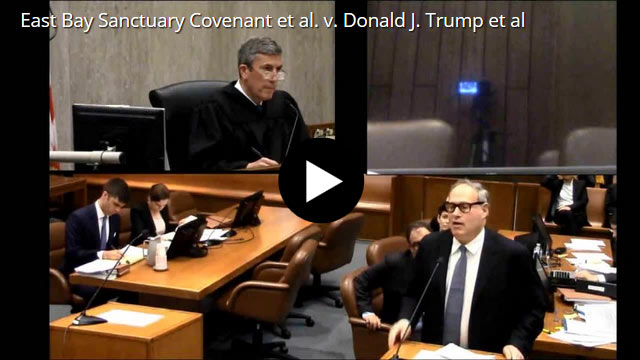Requesting Zoom Access to Court Proceedings
The public is welcome to attend almost all in-person court proceedings in the courthouse. In addition, judges may consider the public’s request for permission view court proceedings by Zoom (see Civil Local Rule 77-3). Requests for Zoom access may be submitted in civil cases only, and not for jury trials; requests giving fewer than 14 days’ notice are disfavored.
Please check the judge’s calendar or email the courtroom deputy to see if a particular hearing is already scheduled to occur by Zoom. If not, please click the box below to submit your request to view the hearing by Zoom.
Requesting a Recording Be Made of Court Proceedings (“Cameras in the Courtroom”)
Civil hearings and bench and jury trials in the Northern District may be recorded by court staff and published to a webpage for viewing or download by the general public.

Procedures
Hearings and trials in any civil case assigned to a judge participating in the Pilot Project are eligible for video recording, upon request and with the consent of the parties and the presiding judge. The judges currently participating in the Pilot Project are listed on this page.
- Requests for video recording must be submitted at least 21 calendar days before a scheduled hearing date. Blanket requests or objections submitted before any matter is scheduled will be rejected. Requests to record matters scheduled without 21 days’ lead time are considered on a case-by-case basis.
- Requests to record may be made by the judge, any party to the case, a member of the public, or the media.
Once a Request for Video Recording is submitted for a particular matter on a participating judge’s calendar, a Notice of Request for Video Recording will be filed on the case docket.
- Consent to recording will be presumed unless a party submits an Objection to Video Recording (.pdf) by the deadline (typically 7 calendar days of the date the Notice of Request for Video Recording is filed). Objections must be emailed to the address on the form; they are not e-filed nor are they part of the public record in a case.
- A party may object to the recording of all or a portion of the proceeding or of only a certain witness or witnesses.
- After the period for submitting objections has passed, a Notice Regarding Video Recording will be filed on the case docket to inform the parties, the requester and the public whether the proceeding, or a portion of it, will be recorded.
After a proceeding is video recorded, it will be made available to the public on the U.S. Courts Cameras in Courts web page (USCourts.gov). Videos will be made available as soon as possible, but the Court cannot provide exact dates or guarantee quality.
The presiding judge always maintains the discretion not to record any or all of a proceeding or not to publish any or all of a proceeding that has been recorded. Logistical issues such as availability of equipment and staff may also prevent recording.
Questions regarding the Northern District’s participation in the Pilot Project should be directed to cameras@cand.uscourts.gov. Additional information about the Pilot Project can be found at the U.S. Courts Cameras in Courts web page (USCourts.gov).
Background
The Northern District of California has been participating in the Cameras in the Courtroom Pilot Project for over a decade. The Court’s General Order 65 adopts the Pilot Project Guidelines issued by the Judicial Conference’s Court Administration and Case Management Committee. The national pilot project officially concluded on July 18, 2015, but this District, along with the Western District of Washington and the District of Guam, has been authorized to continue making the Pilot Project available.
Judges Participating in Recording of Court Proceedings (“Cameras in the Courtroom”)
- Alsup
- Breyer
- Chen
- Chesney
- Chhabria
- Donato
- Freeman
- Gonzalez Rogers
- Illston
- Lin
- Martínez-Olguín
- Orrick
- Pitts
- Tigar
- White
- Wilken
